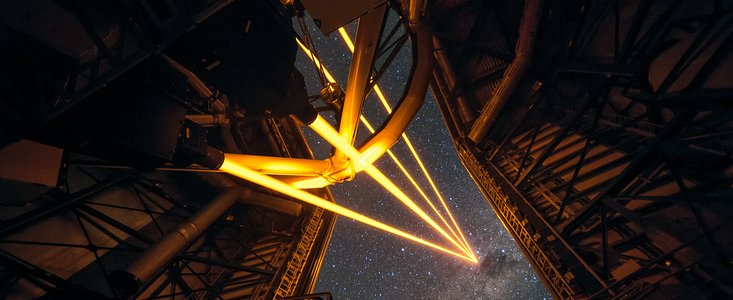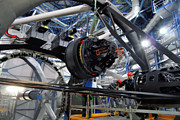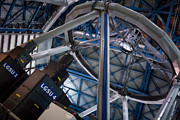Anúncio
Infraestrutura de Óptica Adaptativa do VLT recebe Prémio 2018 para a Equipa Tecnológica de Excelência Paul F. Forman
18 de Setembro de 2018
A Sociedade de Óptica (OSA) reconheceu o trabalho pioneiro realizado pela equipa da Infraestrutura de Óptica Adaptativa (AOF) do ESO. A equipa da AOF recebeu o Prémio 2018 para a Equipa Tecnológica de Excelência Paul F. Forman, o qual foi entregue durante a cerimónia de entrega de prémios Fronteiras da Óptica (FiO) + Ciência com Lasers (LS), que decorreu a 17 de Setembro em Washington, D.C., EUA.
O prémio foi conferido à equipa pelo seu trabalho em fornecer óptica adaptativa aos instrumentos do Yepun, o Telescópio Principal nº 4 de 8,2 metros do Very Large Telescope do ESO. A AOF consistiu num projeto de grande envergadura para melhorar a visão dos instrumentos MUSE (Multi Unit Spectroscopic Explorer) e HAWK-I (High Acuity Wide-field K-band Imager), permitindo-lhes assim compensar o efeito de distorção causado pela atmosfera terrestre [1].
A engenharia de grande complexidade e precisão por detrás da AOF foi agora reconhecida com o Prémio para a Equipa Tecnológica de Excelência Paul F. Forman, recebido por Elise Vernet, Johann Kolb e Robin Arsenault, em nome de toda a equipa. Este prémio é atribuído todos os anos para comemorar os maiores avanços técnicos ou contribuições para a sociedade no campo da engenharia óptica e noutras ocasiões foi entregue a equipas de engenheiros que trabalham em projetos de vanguarda, tais como o “Advanced LIGO experiment”, que foi utilizado para detectar ondas gravitacionais provenientes da colisão entre buracos negros e estrelas de neutrões.
A engenharia por detrás dos telescópios do ESO foi já anteriormente reconhecida com este galardão prestigioso. Em 2017, a Guide Star Alliance recebeu o prémio pela criação de estrelas guia laser de grande potência (SodiumStar). A SodiumStar resultou de uma colaboração industrial entre a equipa da AOF do ESO, a TOPTICA Photonics e a MPB Communications (MPBC), sendo sido identificada como uma tecnologia chave para a próxima geração de telescópios terrestres [2].
Através deste claro exemplo de engenharia inovadora, a equipa da AOF proporcionou aos astrónomos dos Estados Membros do ESO uma ferramenta valiosa para explorar o Universo. Além disso, a experiência adquirida pelos engenheiros do ESO será essencial para superar futuros desafios de engenharia, tais como a construção do Extremely Large Telescope, que será o maior olho do mundo virado para o céu.
Notas
[1] A AOF é composta por diversas partes que trabalham em conjunto, incluindo a Infraestrutura de Quatro Estrelas Guia Laser (4LGSF ) e o espelho secundário deformável muito fino do Telescópio Principal nº 4. A 4LGSF lança para o céu quatro raios laser de 22 watt, fazendo com que os átomos de sódio existentes na atmosfera superior brilhem e produzam pontos de luz no céu que parecem estrelas. Os sensores dos módulos de óptica adaptativa GRAAL e GALACSI usam estas estrelas guia artificias para determinar as condições atmosféricas e as correções necessárias para melhorar a qualidade das imagens. O sistema AOF adapta-se, mil vezes por segundo, às condições atmosféricas ao modificar a forma do Espelho Secundário Deformável do telescópio de modo a compensar os distúrbios atmosféricos. Este processo requer coordenação entre os muitos subsistemas diferentes e é o que permite à AOF fornecer uma visão extremamente nítida ao MUSE e ao HAWK-I.
[2] Outros parceiros industriais foram igualmente cruciais no sucesso da AOF. A Microgate e ADS entregaram o Espelho Secundário Deformável, do qual uma parte integral é a concha de espelho fina de 1,1 m fabricada pela SAGEM-REOSC. A NTE Sener entregou o sistema opto-mecânico do GRAAL e a TNO produziu telescópios de lançamento para a Infraestrutura de Quatro Estrelas Guia Laser. A NOVA contribuiu significativamente para o sistema ASSIST, o qual foi usado para avaliar a AOF na Europa, e o consórcio MUSE, para além de fornecer um instrumento de vanguarda, ajudou a avaliar o desempenho da AOF.
Links
- Infraestrutura de Óptica Adaptiva
- Primeira luz para Infraestrutura de Óptica Adaptiva de vanguarda
- Membros da Equipa da AOF
Contactos
Robin Arsenault
AOF Project Manager
Garching bei München, Alemanha
Tel: +49 89 3200 6524
Email: rarsenau@eso.org
Calum Turner
ESO Public Information Officer
Garching bei München, Alemanha
Tel: +49 89 3200 6670
Email: pio@eso.org
Sobre o anúncio
| Id: | ann18066 |



